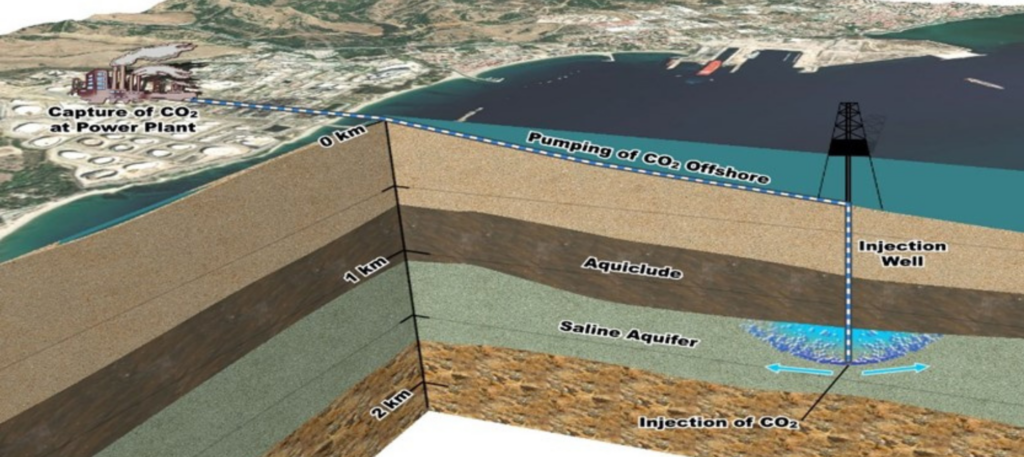
Nancy Zalutsky
Water Rights Specialist and Certified Paralegal
Looking to stake your claim on a little piece of Earth? How about the unoccupied pore spaces within rock formations? As carbon capture and sequestration (CCS) gains steam, the ownership of pore space has become a topic of legal debate.
Historically used for natural gas storage and produced water disposal, pore space is now catching the attention of oil producers looking to cash in on CCS. With tax incentives and climate change initiatives on the rise, several states have taken steps to define pore space ownership. In this blog post, we’ll dive into the legal issues surrounding pore space ownership and the current case law surrounding its use for CO2, natural gas storage, and wastewater disposal.
Understanding Pore Space
Pore space refers to the spaces within a rock that are occupied by solid material. The term is also used to describe depleted subsurface geological formations that are used as storage reservoirs for the storage of natural gas or other minerals.
Over the past year, interest in carbon capture and sequestration or carbon capture and storage (CCS) has reemerged as a result of significant increases in tax incentives for carbon capture as well as the Biden administration’s support for further advancing CCS as part of its focus on climate and energy issues.
Although pore space has been used for natural gas storage for decades, the question of whether the surface owner or the mineral owner owns the pore space is far from settled. As described in the following paper, several states conducted studies on the legal impediments to CCS. Those states issued reports on the legal issues, proposed amendments to state laws and enacted laws defining who owns the pore space.
Oil producers are now interested in using pore space for CCS. The few state laws determining pore space ownership are described below followed by a discussion for current case law. That current case law involved the use of pore space for CO2, natural gas storage and wastewater disposal.
STATE LAWS ADDRESSING OWNERSHIP
The debate around pore space ownership has gained momentum in recent years as oil producers have begun to explode the potential of pore space for CO2 injection and storage. As a result, several states have enacted laws clarifying pore space ownership, while others are still in the process of addressing this issue.
Montana, Oklahoma, Wyoming, North Dakota, Kentucky, Utah, and West Virginia have all enacted laws that define or clarify the ownership of pore space. In Montana, for example, the surface owner owns the geologic storage reservoir if the ownership cannot be determined from the property’s deeds or severance documents. Similarly, Oklahoma law states that pore space is owned by the surface owner subject to reasonable use by the mineral owner.
AMERICAN VS. ENGLISH RULE
Most states that do not have specific laws regarding pore space ownership follow the “American Rule”, which supports the surface owner’s ownership of pore space but requires them to allow the mineral owner to deplete the subsurface area before leasing the pore space to another. The majority of court decision in these states have also followed this rule. However, a minority of states follow the “English Rule”, which supports the mineral estate owner’s ownership of pore space. Kentucky, Alaska, and Texas are the only states that still apply this rule, with Kentucky being the only state to apply it specifically to natural gas storage.
The Bureau of Land Management (BLM) follows the American rule, which supports the surface owner’s ownership of pore space, in BLM Instruction Memorandum 2022-041 (IM 2022-041) issued in June 8,2022. However, the federal government likely owns the pre space for lands patented under the Stock-Raising Homestead Act in 1916 (SRHA), which cover some 70 million acres of subsurface pore space located under private land in the West.
UNCERTAINTY SURROUNDING OWNERSHIP
Undecided oil and gas producing jurisdictions, such as Pennsylvania, Ohio, and Colorado, have yet to address who owns the pore space, leaving the issue open to interpretation. Property rights related to surface and mineral estates are typically determined by state law, not federal law.
It’s important to note that laws and court decisions regarding pore space ownership can be complex and can vary depending the specific circumstances and language of the property deeds or severance documents. For example, a 2021 North Dakota district court decision struck down a law that gave surface owners ownership of the pore space, while a 2022 West Virginia law vested title to pore space in the surfacer owner.
Recent state developments include Indiana enacting a law clarifying the definition of “pore space”, outlining CO2 injection rights, and providing a process by which the state would assume the responsibility and associated liability for stored CO2 following a CCS project’s completion. However, the law defines “pore space owner” as someone that has title to, a right to, or an interest in pore space. The Illinois 101st General Assembly considered but failed to pass HB 4370, which defined “pore space owner” as the person, trust, corporation, or other entity who has title to the pore space. Two bills defining pore space were introduced in the Kansas Legislature in 2011 and 2012.
CONCLUSION
As the debate surrounding pore space ownership continues to unfold, it’s crucial to stay informed about the legal implications of managing these spaces. B3 Insight is committed to providing comprehensive data and analytics solutions to help oil and gas companies make informed decisions about water management, including the use of pore space for CCS.
With the growing importance of water management in unconventional oil and gas production, it’s more important than ever to partner with industry leaders like B3 Insight to stay ahead of the curve. Contact us today to learn more about our solutions and how we can help your company navigate the challenges of water management in the oilfield.
Above Image Source: https://www.hgl.com/subsurface-carbon-sequestration-and-storage/
EMPOWERING SMART WATER MANAGEMENT
B3 Insight is building the definitive source for water data. We empower smart water management with data-driven intelligence for responsible and profitable decisions about water resources. Whatever your needs, B3 Insight’s OilfieldH2O can positively impact your water management and drilling completions – contact us at [email protected] or 720-664-8517 to learn more.




